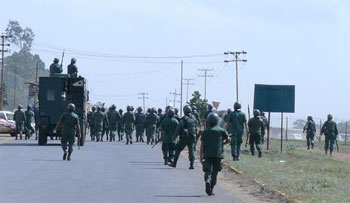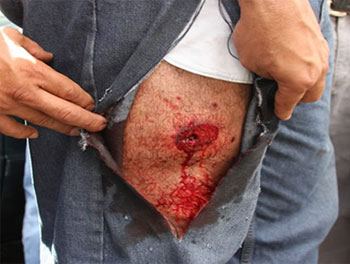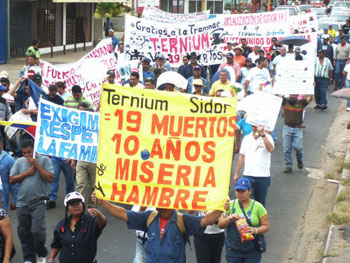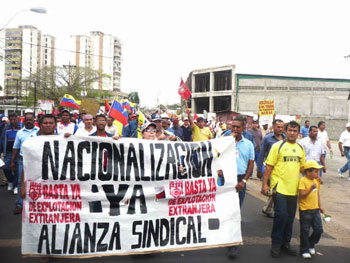Chávez renationalises SIDOR - victory for the workers!
- 16 April 2008
On the 9th of April, Venezuelan vice-president Ramon Carrizalez announced the decision of President Chávez to renationalise the giant steel plant SIDOR (privatised in 1997 under the Caldera government) located in the southern state of Bolivar. The decision was taken as the Argentinean-Italian multinational group Techint (the majority shareholder) refused to make concessions to the workers in the collective bargaining agreement.
 |
| National Guard repression |
The workers of SIDOR have been campaigning for more than 15 months. The main points of contention were: 1) wage increase, where the company offered very little and wanted to spread any increase over a 30-month period; 2) the question of subcontracting, where the workers were demanding that all subcontracted workers (9,000 out of a total workforce of 15,000) should be incorporated into the main workforce, and 3) a substantial increase in pensions.
Techint has made multi-million dollar profits, whilst the working conditions at the plant have plummeted, resulting in a marked increase in deaths and accidents. José Rodriguez, leader of the workers' union SUTISS, described the past ten years as "humiliation and ill treatment on the part of the multinational, which has outraged the workers and the country", and he blamed Techint for the fatal catalog of accidents that have left 18 workers dead.
When Chávez made a call to "nationalise all that was privatised", in January 2007, the workers responded with spontaneous walkouts, raising the Venezuelan flag over the factories. Pressurised by the Argentinean government, the Venezuelan government made an agreement with Techint to sell its products at cheaper prices in exchange that the company would not be nationalised. But Techint continued to maintain a provocative attitude towards the workers, and finally patience run out, resulting in a series of strikes earlier this year.

|
| Wounded worker |
What was the response of the Ministry of Labour? First they tried to force the workers to accept Techint's deal. Then, on March 14th, the National Guard was sent in to break a strike. Several workers were arrested, including union leader Acarigua, and many were injured. The National Guard acted in a particularly vicious manner, damaging the workers' cars and property. The workers, the community, and the whole region responded with clear class instinct, organising solidarity meetings, pickets, and threatening strikes in other plants.
This incident is the most serious clash to take place between workers and the National Guard under the Chávez government. The workers denounced the local commander of the National Guard, accusing him of acting on orders from the company management. Here we see one of the most important challenges facing the Venezuelan revolution. The old state apparatus, created and perfected over 200 hundred years to serve the interests of the ruling class, although weakened by the revolution, is still largely intact.
As a Bolivarian MP for Guyana said: "I consider these abuses to be a long way from the revolutionary principles promoted by the President of the Republic." El Zabayar, who came out publicly for the nationalisation of SIDOR further explained that, "There are sectors within the state that play at wearing down the government, using governmental authorities to assume a pro-bosses attitude".
Even after this brutal repression, the Ministry of Labour (which also played a dreadful role in the struggle of the workers at the ceramics factory Sanitarios Maracay), insisted on calling a referendum of the SIDOR workers to make them accept the company's proposal. The workers remained united and opposed this ballot, calling their own ballot on April 3rd. They overwhelmingly rejected SIDOR's offer, a majority of 3338 votes against only 65.
 |
| March to the Bolivarian University |
On April 4th, the workers marched to the Bolivarian University in Bolivar, demanding to be heard by president Chávez, who was attending a graduation ceremony. Two days later on live TV Chávez recalled how the SIDOR workers, in the face of death threats, opposed the bosses' lockout in 2002. He added that the "revolutionary government has to demand from any company, national or multinational, to abide by Venezuelan laws", referring to the law passed on May Day last year which outlaws subcontracting. He also announced that he had instructed the Vice-president Ramon Carrizalez to try to settle the issue.
Chávez added that he had had harsh words with the regional governor over the repression by the National Guard.
A three party meeting between the company, the union and the vice-president took place on March 8th, in which the vice-president Carrizalez asked the company one last time if they were prepared to agree to the union's offer on wages. The company refused, and president Chávez announced the nationalisation of SIDOR.

Thousands of workers immediately started to celebrate a victory that they did not even believe was possible. In fact the leadership of the union had declared a few hours before that after signing the collective bargaining agreement they would then continue the campaign for the nationalisation of SIDOR.
This is yet another turning point in the Venezuelan revolution. This is not a small bankrupt company but the country's only supplier of steel and Latin America's fourth largest producer. This decision is likely to provoke a backlash on the part of the multinational and also on the part of the Argentinean government. The Venezuelan revolution and its supporters abroad, particularly in Argentina, must be ready to withstand this pressure and launch a campaign in defense. But nationalisation in itself does not guarantee the interests of the workers and the Venezuelan people. Chávez has insisted that the workers must set up workers' councils, and that SUTISS exercise a policy of workers' control and management.
The renationalisation of SIDOR is an important victory. In the last few months, the oligarchy has stepped up its campaign of sabotage, particularly in the food distribution sector. This has led the government to nationalise important dairy plants and slaughterhouses. Working people and trade unionists all over the world, many of whom have campaigned hard against privatisation and against subcontracting, will be inspired by these moves.